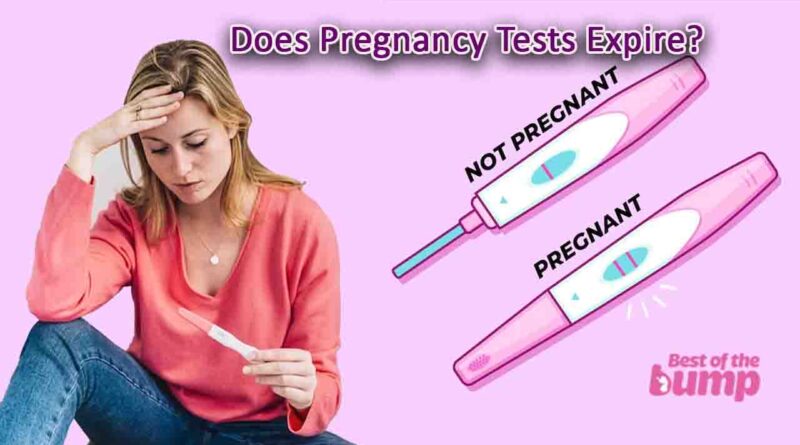Does Pregnancy Tests Expire? – Everything You Need to
Pregnancy tests are invaluable tools for women who are trying to conceive or suspect they might be pregnant. They provide quick and reliable results, offering a glimpse into one of life’s most profound moments. However, like many products, pregnancy tests come with an expiration date, and it’s essential to understand whether and how these expiration dates affect the accuracy of the results.
In this comprehensive guide, we will delve into the topic of pregnancy test expiration. We’ll answer questions like, “Do pregnancy tests expire?” and “What happens if you use an expired pregnancy test?” We’ll also explore the science behind pregnancy tests, their shelf life, storage tips, and when to consider taking a test. By the end, you’ll have all the information you need to confidently navigate the world of pregnancy testing.
The Basics of Pregnancy Tests
Before we dive into the specifics of expiration, let’s begin with a brief overview of how pregnancy tests work. Pregnancy tests detect the presence of a hormone called human chorionic gonadotropin (hCG) in a woman’s urine. This hormone is produced by the placenta shortly after a fertilized egg attaches to the uterine lining.

There are two primary types of pregnancy tests: urine-based tests and blood tests. Urine tests, which are most commonly used, can be done at home with over-the-counter kits or at a doctor’s office. Blood tests, on the other hand, are typically conducted in a healthcare setting.
Before we explore the topic of pregnancy test expiration, it’s crucial to have a solid grasp of how pregnancy tests function. These tests are pivotal tools for women who are trying to determine whether they are pregnant or not. They operate by detecting the presence of a hormone called human chorionic gonadotropin (hCG) in a woman’s body. This hormone is generated by the placenta shortly after a fertilized egg has attached itself to the uterine lining.
Pregnancy tests primarily come in two forms:
- Urine-based tests and
- Blood tests
The urine-based tests are the most widely used and are available in over-the-counter kits for home use, while blood tests are typically administered in a healthcare facility.
Let’s take a closer look at these two types of tests:
Urine-Based Pregnancy Tests
These tests are designed for convenience and ease of use. They rely on a urine sample collected by the woman herself. Urine-based pregnancy tests are available without a prescription and are commonly used in home settings. They are known for their simplicity and rapid results.
Blood Tests for Pregnancy
Blood tests are conducted in a medical setting, usually by a healthcare professional. There are two types of blood tests for pregnancy: qualitative and quantitative. Qualitative blood tests determine the presence or absence of hCG in the blood, while quantitative blood tests measure the exact amount of hCG. These tests are more sensitive than urine-based tests and can detect pregnancy at an earlier stage.
Understanding the fundamental principles of how pregnancy tests operate is essential before delving into the specifics of their expiration and accuracy. In the following chapters, we will explore the significance of expiration dates on pregnancy tests and how they can impact the reliability of the results.
Do Pregnancy Tests Expire?
Yes, pregnancy tests do have expiration dates. These dates are essential for maintaining the accuracy and reliability of the test results. Using an expired pregnancy test may yield inaccurate results, which can be misleading and emotionally distressing.
As we’ve established, pregnancy tests indeed have expiration dates, and these dates are crucial factors in ensuring the accuracy and reliability of the results. Using an expired pregnancy test may lead to outcomes that are both misleading and emotionally distressing.
How to Check the Expiration Date
Locating the expiration date on a pregnancy test is a straightforward yet crucial step before using it. The expiration date is typically printed on the packaging, which includes the box or foil pouch containing the test. It may also be found on the individual test cassette or strip. Always double-check this date to ensure that you are using a valid and reliable test.
How Long Do Pregnancy Tests Last?
The shelf life of pregnancy tests can vary depending on the brand and type. However, most pregnancy tests are designed to remain effective for up to two to three years from the date of manufacture. Beyond this period, the reliability of the test decreases.
Understanding how long pregnancy tests remain reliable is essential for anyone considering taking one. In this chapter, we will delve deeper into the shelf life of pregnancy tests and the factors that influence it:
Typical Expiration Period
Most pregnancy tests available on the market are designed to maintain their accuracy for a period of two to three years from the date of manufacture. This means that if you purchase a pregnancy test that is within this time frame, you can reasonably expect it to provide reliable results when used according to the instructions.
It’s worth noting that different brands and types of pregnancy tests may have slightly varying expiration periods. Therefore, it’s crucial to check the packaging for the specific expiration date to ensure the test’s reliability.
Why Do Pregnancy Tests Expire?
Pregnancy tests have an expiration date for several reasons:
- Chemical Stability: Pregnancy tests contain specific chemicals and compounds, such as antibodies and enzymes, that are responsible for detecting the presence of hCG (human chorionic gonadotropin) in a woman’s urine. Over time, these chemicals can degrade or lose their effectiveness, making the test less sensitive to hCG levels.
- Accuracy Assurance: Manufacturers set expiration dates to guarantee the accuracy and reliability of their products. Using a test beyond its expiration date may result in less accurate results, potentially leading to false negatives or positives.
- Quality Control: Expiration dates are part of the quality control measures implemented by manufacturers. They help ensure that consumers receive pregnancy tests that meet the highest standards of performance and accuracy.
How to Check the Expiration Date
Locating the expiration date on a pregnancy test is crucial before use. The expiration date is usually printed on the packaging, typically on the box or foil pouch containing the test. It’s essential to double-check this date to ensure you are using a valid test.
Knowing how to locate the expiration date on a pregnancy test is a fundamental step to ensure the reliability of the results. In this chapter, we will guide you on where to find the expiration date:
Packaging Location
The expiration date of a pregnancy test is typically printed on the packaging. Here’s where you can commonly find it:
- Box: If you’ve purchased a pregnancy test kit that comes in a box, check the outer packaging. The expiration date is often printed on one of the sides or on the bottom of the box. It is usually clearly marked for easy identification.
- Foil Pouch: Some pregnancy test kits are individually sealed in a foil pouch. In such cases, the expiration date is usually printed on the outside of the pouch. Look for the date before opening the pouch.
- Test Cassette or Strip: In certain brands, you might also find the expiration date printed directly on the test cassette or strip itself. Ensure that you examine the test thoroughly before use to locate this information.
Double-Check the Date
Once you’ve identified the expiration date, it’s crucial to double-check it to ensure that you are using a valid and reliable test. Make sure the date is still within the stated period of effectiveness, which is typically two to three years from the date of manufacture.
Using a pregnancy test beyond its expiration date can compromise the accuracy of the results, which may lead to unnecessary confusion and anxiety. Therefore, always pay close attention to this vital piece of information before proceeding with the test.
Can an expired pregnancy test still work?
In general, pregnancy tests are designed to be reliable and accurate up to their expiration date. However, the accuracy of a pregnancy test can diminish over time as it approaches and passes its expiration date. Here are a few key points to consider:
Expiration Dates Are Important
Expiration dates are there for a reason. They indicate the date until which the manufacturer guarantees the test’s accuracy and reliability. Using a pregnancy test that is significantly past its expiration date may lead to less accurate results.
Diminished Sensitivity
Over time, the chemicals and materials used in the test may degrade. This can affect the test’s sensitivity to the pregnancy hormone hCG (human chorionic gonadotropin). A test that has passed its expiration date may be less likely to detect lower levels of hCG, which can result in false-negative results.
Potential for False Results
Using an expired pregnancy test could yield incorrect results. This means you might get a false-negative result (indicating you’re not pregnant when you are) or a false-positive result (indicating you’re pregnant when you’re not). Both scenarios can be emotionally distressing and lead to confusion.
Proper Storage Matters
Even before the expiration date, how you store a pregnancy test can impact its accuracy. Exposure to heat, humidity, or direct sunlight can affect the test’s reliability. Always store pregnancy tests according to the manufacturer’s instructions.
In summary, while it’s possible for an expired pregnancy test to work, it’s not advisable to rely on one for accurate results, especially if you suspect you might be pregnant. To ensure the most reliable results, it’s best to use a pregnancy test that is within its stated expiration date and has been stored correctly. If you have concerns about your pregnancy status, it’s wise to use a fresh, unexpired test or consult with a healthcare professional for further guidance.
What Happens if You Use an Expired Pregnancy Test?
Using an expired pregnancy test can lead to inaccurate results. These inaccuracies may include false negatives (indicating no pregnancy when you are pregnant) or false positives (indicating pregnancy when you are not). In either case, the emotional toll can be significant.
It’s vital to understand the potential consequences of using an expired pregnancy test, as this knowledge can help you make informed decisions when it comes to pregnancy testing. In this chapter, we will delve into the outcomes of using an expired test and why it’s crucial to avoid them:
False Negatives
One of the significant risks associated with using an expired pregnancy test is the potential for false negatives. A false negative result occurs when the test incorrectly indicates that you are not pregnant when, in fact, you are. This can happen because the test’s sensitivity to hCG, the pregnancy hormone, may diminish as the test ages.
Experiencing a false negative result can be emotionally distressing, especially if you were hoping for a positive outcome. It can lead to confusion and disappointment, potentially delaying necessary prenatal care or adjustments to your lifestyle.
False Positives
Conversely, an expired pregnancy test may also produce false positive results, indicating that you are pregnant when you are not. This can happen if the test’s components degrade over time, causing it to produce a positive result based on factors other than the presence of hCG.
A false positive result can be equally unsettling. It may lead to unnecessary worry, stress, and anxiety as you grapple with the prospect of an unplanned pregnancy that is, in reality, not the case.
Emotional Impact
Both false negatives and false positives resulting from an expired pregnancy test can have a significant emotional impact. The stress, confusion, and uncertainty they create can take a toll on your well-being, affecting your mental and emotional health during an already sensitive time.
To avoid these potential consequences, it’s crucial to ensure that you are using a pregnancy test within its stated expiration date. In the following chapters, we will further explore factors that can affect the accuracy of pregnancy test results and provide guidance on proper storage practices. This information will help you navigate the world of pregnancy testing with confidence and peace of mind.
Factors Affecting Test Accuracy
While expiration dates are critical, other factors can also impact the accuracy of a pregnancy test. These factors include the timing of the test, the concentration of hCG in your urine, and the sensitivity of the test.
Beyond the expiration date, several other factors can influence the accuracy of a pregnancy test. Understanding these factors is essential for obtaining reliable results. In this chapter, we will explore the variables that can affect the accuracy of pregnancy tests:
Timing of the Test
The timing of when you take a pregnancy test is crucial. hCG, the hormone that pregnancy tests detect, takes some time to accumulate in the body after conception. If you test too early, even with a non-expired test, you may get a false negative result because there isn’t enough hCG in your urine for the test to detect.
For the most accurate results, it’s generally recommended to wait until the day of your expected period or a few days after. Some early detection tests claim to provide accurate results a few days before your expected period, but even these tests have limits to their sensitivity.
Concentration of hCG
The concentration of hCG in your urine can vary from person to person and can change throughout the day. hCG levels tend to be higher in the morning due to the concentrated urine. If you test with less concentrated urine later in the day, the test may be less sensitive to lower hCG levels, potentially leading to a false negative.
To maximize accuracy, it’s advisable to use your first-morning urine when taking a pregnancy test. This is when hCG levels are typically at their highest concentration.
Sensitivity of the Test
Pregnancy tests come in different sensitivities. Some are designed to detect very low levels of hCG, making them suitable for early testing, while others are more sensitive and may detect pregnancy later in the process. Understanding the sensitivity of the test you are using is important for getting accurate results.
Low-sensitivity tests may not work well for early detection, while high-sensitivity tests might provide earlier results but may also be more prone to giving false positives if used too early or if the test has expired.
By considering these factors, along with the test’s expiration date and proper storage, you can enhance the accuracy of your pregnancy test results.
Proper Storage of Pregnancy Tests
To ensure the longevity and accuracy of pregnancy tests, proper storage is essential. Factors like temperature, humidity, and exposure to light can all affect the test’s reliability.
Proper storage of pregnancy tests is a critical aspect of maintaining their accuracy and reliability. Various environmental factors can influence the effectiveness of the test, and understanding how to store them correctly is vital. In this chapter, we will explore the importance of proper pregnancy test storage:
Temperature Control
Temperature plays a significant role in maintaining the integrity of pregnancy tests. It’s essential to store them at a controlled room temperature, typically between 36°F (2°C) and 86°F (30°C). Extreme temperatures, either too hot or too cold, can negatively impact the test components, potentially affecting the test’s sensitivity and reliability.
Avoid storing pregnancy tests in areas exposed to direct sunlight, as prolonged exposure to UV rays can also degrade the test materials.
Humidity Management
Humidity levels can impact the performance of pregnancy tests. Excess humidity can cause the test components to deteriorate, while overly dry conditions may lead to desiccation, affecting the test’s reliability. To prevent these issues, store pregnancy tests in a dry environment with controlled humidity levels.
Protecting from Contaminants
Keep pregnancy tests in their original packaging until you are ready to use them. This helps protect the test from potential contaminants in the environment, such as dust and airborne particles, which can affect the test’s accuracy.
Avoid Extreme Conditions
Refrain from storing pregnancy tests in places with extreme temperature fluctuations, such as bathrooms, where temperatures can vary due to showers or baths. These fluctuations can compromise the test’s sensitivity over time.
By adhering to proper storage practices, you can maximize the accuracy and reliability of pregnancy test results.
When Should You Take a Pregnancy Test
Knowing when to take a pregnancy test can significantly impact its accuracy. We will discuss the ideal timing for testing, including the early detection capabilities of different tests and the importance of following instructions carefully.
The timing of when you take a pregnancy test is crucial to its accuracy. In this chapter, we will explore the ideal timing for pregnancy testing, taking into account early detection capabilities, and the importance of following test instructions carefully:
Early Detection Tests
Some pregnancy tests claim to offer early detection capabilities, allowing you to test a few days before your expected period. These tests are designed to be more sensitive to lower levels of hCG (human chorionic gonadotropin), the pregnancy hormone, which can appear in the urine shortly after implantation.
While early detection tests can provide results before your missed period, they are not foolproof, and accuracy can vary from person to person. Testing too early may result in a false negative, as hCG levels may not yet be detectable by the test.
Testing Around Your Expected Period
For the most accurate results, it’s generally recommended to wait until the day of your expected period or a few days after. By this time, hCG levels are more likely to be at a detectable level, increasing the test’s reliability.
Testing around your expected period reduces the risk of false negatives and false positives, providing a clearer picture of your pregnancy status. If you have irregular periods or are unsure about your cycle, it’s best to wait until at least 14 days after potential conception for more reliable results.
Follow Test Instructions Carefully
To maximize accuracy, always follow the test instructions provided with the pregnancy test kit. Each brand and type of test may have specific guidelines for use. Pay attention to details such as the recommended time frame for reading results and the proper method for collecting and applying urine to the test.
Additionally, check the expiration date on the packaging to ensure the test is within its period of effectiveness.
In conclusion, the timing of your pregnancy test is critical to obtaining accurate results. While early detection tests may offer the possibility of testing before your expected period, it’s essential to remain cautious and aware of the potential for false results. Testing around your expected period and following instructions carefully are key steps in achieving reliable pregnancy test outcomes.
Types of Pregnancy Tests
Understanding the various types of pregnancy tests available on the market is essential for making informed choices about your testing experience. In this chapter, we will explore the differences between digital and non-digital pregnancy tests and outline the advantages and disadvantages of each:
Digital Pregnancy Tests
Digital pregnancy tests are known for their user-friendly, clear results. They typically display results using words like “pregnant” or “not pregnant” rather than traditional lines. Here are some pros and cons of digital pregnancy tests:
Pros:
- Clear Readings: Digital tests provide straightforward results, eliminating the need to interpret lines, which can sometimes be confusing.
- Accuracy: Digital tests are known for their accuracy and sensitivity, often capable of detecting pregnancy early.
Cons:
- Cost: Digital tests are often more expensive than non-digital options.
- Battery Requirement: Digital tests require batteries to operate, and if the battery runs out, the test may not work.
Non-Digital Pregnancy Tests
Non-digital pregnancy tests are the traditional line-based tests that display one or more lines to indicate pregnancy. Here are some pros and cons of non-digital pregnancy tests:
Pros:
- Affordability: Non-digital tests are typically more budget-friendly.
- Availability: They are widely available in various brands and types.
Cons:
- Interpretation: Non-digital tests require interpretation of lines, which can sometimes be subjective and lead to confusion.
- Sensitivity: Some non-digital tests may be less sensitive than digital tests, potentially requiring a higher level of hCG for accurate results.
In summary, the choice between digital and non-digital pregnancy tests often comes down to personal preference and budget. Both types can be reliable when used correctly and within their expiration dates.
As we conclude this comprehensive guide on pregnancy test expiration, we will recap the key takeaways and provide you with a clear understanding of the significance of checking expiration dates, proper storage practices, and the factors influencing test accuracy. Armed with this knowledge, you can approach pregnancy testing with confidence and clarity during this transformative phase of your life.
Can cheap pregnancy tests be wrong?
The cost of a pregnancy test does not necessarily determine its accuracy. In this final chapter, we will address the common misconception that cheap pregnancy tests are less reliable and discuss the factors that can affect the accuracy of any pregnancy test, regardless of its price:
Factors Affecting Accuracy
The accuracy of a pregnancy test depends on several factors, including:
- Timing: Testing too early or too late in your menstrual cycle can lead to inaccurate results.
- Hormone Levels: The concentration of hCG (human chorionic gonadotropin) in your urine can vary from person to person and may not be detectable by some tests in the very early stages of pregnancy.
- Test Sensitivity: Some pregnancy tests are designed to detect lower levels of hCG, making them more suitable for early detection. Others may require higher levels of hCG for a positive result.
- Proper Usage: Following the test instructions carefully and using first-morning urine can enhance accuracy.
Affordable Options
Cheap pregnancy tests are often as accurate as their more expensive counterparts when used correctly and within their expiration dates. These tests are widely accessible and can provide reliable results.
Reliability Across Brands
Pregnancy tests from reputable brands, regardless of their price, undergo rigorous quality control measures to ensure accuracy and reliability. Therefore, the cost of a pregnancy test does not necessarily determine its effectiveness.
Ensuring Accuracy
To ensure the accuracy of your pregnancy test results, focus on factors like proper timing, using the first-morning urine, and adhering to the test’s instructions. Checking the test’s expiration date and storing it correctly are also essential for reliable results.
In conclusion, the affordability of a pregnancy test does not inherently impact its accuracy. By understanding the factors that affect test reliability and following proper testing procedures, you can obtain accurate results, regardless of the test’s cost. This comprehensive guide has equipped you with the knowledge needed to navigate pregnancy testing with confidence and clarity, ensuring that you can make informed decisions during this transformative period in your life.




